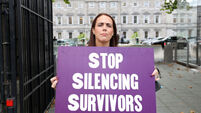Sarah Harte: Should there be signs in men's bathrooms asking: 'Are you a sexual predator?'

Justice Minister Helen McEntee spoke this month about doubling the number of domestic violence refuges across this country. This is vital work because we need them. Picture: Sasko Lazarov/Photocallireland
We live on a small island which is why the fact four women were killed in the North over six weeks should concern us. Mary Ward was found dead at her home on October 1 with neck wounds and a man has appeared in court charged with her murder.
North and south of the border, domestic abuse, violence and sexual violence against women are at an all-time high. Justice Minister Helen McEntee spoke this month about doubling the number of domestic violence refuges across this country. This is vital work because we need them. It is high time we had a national conversation about why we need them and what we can do to prevent the deep societal misogyny from which it springs.















